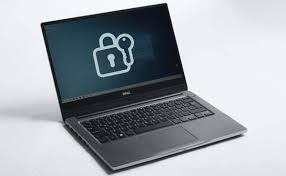Have you ever fired up your trusty Dell laptop, only to be greeted with a confusing screen asking for a mysterious “Bit Locker Recovery Key”? Don’t panic! The purpose of this guide is to explain why this happens, what BitLocker Recovery Key On a Dell Laptop is, and most importantly, how to access your laptop again.
Why Choose Bit Locker? Encryption Power for Your Dell
Imagine a locked safe for your digital life. That’s what Bit Locker essentially is – a built-in encryption tool on Windows that scrambles the data on your Dell’s hard drive. This makes it unreadable to anyone who doesn’t have the key, keeping your precious files safe in case of theft, loss, or unauthorized access.
Think of it like your top-secret documents: even if someone stumbles upon your laptop, they won’t be able to decipher the information within without the key. Pretty cool, right?
Types of Bit Locker Recovery Keys: Knowing Your Options
There are two main ways you might have obtained your Bit Locker Recovery Key during the initial setup:
Saved to your Microsoft Account: This is the most common method. During Bit Locker activation, Windows might have offered to store your key securely in your Microsoft account. This is a convenient option, as you can access it from any device with an internet connection.
Printed or Saved as a File: Alternatively, you might have chosen to print a physical copy of the key or save it as a file on another device (like a USB drive) for safekeeping.
Pro Tip: Whichever method you used, make sure you know where your Bit Locker Recovery Key is located before you actually need it.
Benefits of Bit Locker: Keeping Your Data Safe and Sound
So, why go through the extra steps of setting up Bit Locker? Here are some key benefits:
Peace of Mind: Knowing your data is encrypted gives you peace of mind. If your laptop is stolen or lost, you can rest assured that your private information and files are protected from prying eyes.
Enhanced Security: Bit Locker adds an extra layer of security to your Dell laptop, especially useful if you work with sensitive data.
Regulatory Compliance: In some professions or industries, data encryption might be mandatory to comply with regulations.
Steps to Take When Your Dell Asks for a Bit Locker Recovery Key
Now, let’s get to the main event – recovering access to your Dell laptop:
Check for the Key: First things first, locate your Bit Locker Recovery Key. If you saved it to your Microsoft account, head over to https://account.microsoft.com/account/manage-my-account and sign in. Navigate to “Devices” and then look for the option to manage recovery keys for your specific Dell device.
Printed Key or File: If you chose to print the key or save it as a file, retrace your steps and find it. Double-check any external drives or folders where you might have stored it.
Entering the Key: Once you have the key, it’s time to unlock your laptop. On the Bit Locker recovery screen, enter the key exactly as it appears (including any hyphens or spaces). Click “Enter” and, with a bit of digital magic, your Dell should boot up normally.
Bit Locker Troubleshoot: If you still can’t access your laptop or can’t find the key, fret not! Dell’s support website offers troubleshooting guides and resources specific to Bit Locker on Dell devices. You can also contact Dell support directly for further assistance.
Important Note: In some rare cases, if you lose your Bit Locker Recovery Key and there’s no way to retrieve it, you might be forced to reset your Dell laptop to factory settings. This will erase all your data, so it’s a last resort.
Conclusion
Bit Locker might seem like a hurdle at first, but it’s a powerful tool that safeguards your data. By understanding why it exists and taking the necessary steps to store your Bit Locker Recovery Key securely, you can ensure your Dell laptop remains a safe haven for your digital life.
FAQs
Can I disable Bit Locker on my Dell laptop?
Yes, you can disable Bit Locker, but this removes the encryption layer and makes your data vulnerable. It’s generally recommended to keep Bit Locker enabled for optimal security.
What if I never set up Bit Locker, but my Dell asks for a key?
This is unlikely, but it’s possible the previous owner of your Dell laptop might have enabled Bit Locker. If you bought the laptop second-hand, try contacting the seller to see if they have
